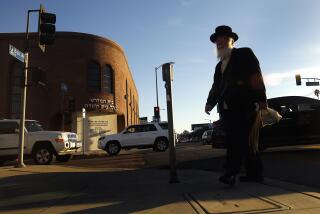Poway School Year Start Date Fuels Religious Controversy
- Share via
As the population at large prepares to celebrate the New Year, members of the Jewish community in Poway are up in arms over what they see as the school district’s insensitivity toward their religious new year.
The school district staff in September recommended a calendar for the 1991-92 school year that puts the first day of school on Monday, Sept. 9, 1991.
The date coincides with Rosh Hashana, the Jewish new year and one of the religion’s two holiest days. Jewish leaders are upset that the school administration failed to take that into consideration when scheduling the first day of classes.
“The community is outraged with the decision that the administration has made,” said Leslye Winkelman Lyons, director of the Jewish Community Relations Council of the United Jewish Federation.
Lyons said Rosh Hashana--for which the date fluctuates, as it is based on the Jewish lunar calendar--normally falls later in the month and rarely provides a conflict with the first day of school.
Jewish leaders advised schools in Poway and the rest of the county last August of the potential conflict, Lyons said. When Poway tentatively set its opening date, Jewish leaders sent letters to the district asking it to change the date. On Nov. 29, they were told that the date would not be changed.
“We let them know early enough that no mechanisms were in place for this yet, and they should have been more sensitive to this,” Lyons said.
Lyons estimates that there are more than 3,000 Jewish households in the Poway Unified District, which serves 24,000 students.
Lyons said Jewish leaders will protest the proposed calendar when it goes before the school board at their next meeting Jan. 14 and might initiate a letter-writing campaign.
Sharon Purviance, a board member of the Poway Unified School District, said: “I am really sorry that they (the district’s staff) didn’t take (Rosh Hashana) into consideration when they first started negotiating about the calendar.”
Now, however, the calendar is set, and it is very difficult to turn back, Purviance said.
The calendar was agreed upon after negotiations among the unions representing the teachers, administration and staff, Purviance said, adding, “There is a committee with representatives from all of the different unions, and they met again after the situation was posed to them, and they still came up with the same recommendation that they started with. The unions are the ones that decide, and the board ratifies it, of course, but we certainly don’t want to go against an agreed-upon bargain.”
Purviance estimated that fewer than 1,000 students would be affected by the calendar.
“There is a small minority of students that are affected by this out of the 24,000 students in our district,” Purviance said. “The principals have been told about this situations, and they are willing to work with the families. If they are going to, say, elect the room monitor or assign team captains or something like that, maybe they can wait another day for that.”
Jack Dyer, assistant superintendent at neighboring Escondido Union Elementary District, agreed that to get a calendar renegotiated after it has already been agreed upon would be “a major maneuver.”
“To follow the practice of opening up your contract is something most districts would think very seriously about,” said Dyer, whose district will begin the school year Sept. 3. “You do not want to go back into that contract once you’ve put it to bed.”
Although Jewish students have the option of staying out of school to observe the religion’s holidays, parents say the first day of school is more important for the students and teachers to get informed about and adjusted to the school year than any other day.
Other districts in the county also plan to open Sept. 3 and say that the Jewish holiday was a concern in the development of the calendar, but not a major one.
“One consideration certainly was looking at the impact of starting school on a Jewish holiday in terms of students and employees that would be affected,” said San Diego City Schools Supt. Thomas Payzant.
Payzant added, however, that the major issue in deciding when the first day of school would be was whether to begin school the day after Labor Day, a practice that was begun this year, or to revert to beginning school on the Monday after Labor Day.
That plan, however, might again be looked at in 1994, when Rosh Hashana coincides with the day after Labor Day.
More to Read
Sign up for Essential California
The most important California stories and recommendations in your inbox every morning.
You may occasionally receive promotional content from the Los Angeles Times.













